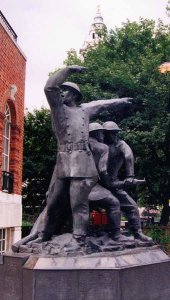|
A
GREAT TERROR ON LONDON
KNOWN
AS THE BLITZ
 On
30th August 1940, the German News Bureau announced to London "The
attacks of our Luftwaffe are only a prelude. The decisive blow is about
to fall." On
30th August 1940, the German News Bureau announced to London "The
attacks of our Luftwaffe are only a prelude. The decisive blow is about
to fall."
For
once, the German propaganda machine spoke the truth. At 4.56pm on the
fine, late summer afternoon of Saturday September 7th, London's air-raid
sirens, later to be known less than affectionately as "Moaning
Minnies", announced the arrival of 375 German bombers and
supporting fighters. They came up the Thames to London from the sea and
set the London docks ablaze. As darkness fell, the fires burnt fiercely
all over East London, and illuminated the efforts of a London Fire
Brigade that was to have no rest for almost two months. This was the
beginning of the London Blitz, and the only mass daylight raid of a
campaign of terror that was characterized by the undaunted spirit of the
civilian population. Although the daylight bombers were gone by 6pm that
evening, the fires were still burning fiercely when the night raiders
arrived to inflict more damage at 8.10pm.
The
raid lasted until 4.30am. Seemingly endless sticks of incendiary bombs
and high explosive rained down. By dawn London had nine major
conflagrations: huge spreading areas of flame, nineteen fires that would
normally have called for thirty pumps or more, forty ten-pump fires, and
nearly a thousand lesser fires, any one of which would have made the
front pages in peace time. Thousands of houses in the inner suburbs
along the Thames were destroyed or damaged in one night. Some 430 men,
women and children were killed and 1,600 were seriously injured.
The
next night, the German bombers came again, this time attacking the
ancient square mile of the City of London, financial capital of the
world, as well as the London docks. For nine and a half hours, 200
bombers droned overhead, causing no less than twelve conflagrations,
putting the railway network to the South of London out of action and
destroying hundreds of houses. A further 412 civilians were killed, and
747 were seriously injured.
On
Monday night, 370 were killed and 1,400 injured. On Tuesday a similarly
frightening trail of destruction was left by another mighty raid. But on
Wednesday London began to fight back, as the anti-aircraft batteries in
the middle of the great sprawling city opened up with their reassuring
racket. No aircraft were destroyed, but casualties were fewer and damage
reduced.
Every
single night for the rest of September the bombers came, the fires
burned, and the death toll mounted. By the end of the month, 5,730
people had been killed and nearly 10,000 badly injured. Roads were
cratered, telephone systems crippled, gas mains fractured, electricity
supplies destroyed. Hospitals all over Greater London were damaged, some
severely.
October
seemed to produce a lessening of the scale of the attack. On the 6th,
only one bomb fell. But still the bombers came every night, people died,
and homes burned. The 15th's full moon was to prove hard on Londoners
who had already endured almost six weeks of continuous bombing. Over 400
bombers arrived and dropped more than a thousand bombs: 430 were killed,
900 badly hurt. The pattern, the grisly monotony, continued until the
nightly raiders left after their attack on the night of November 2nd,
the 57th consecutive night of the Blitz. Wearily, London fought its
fires, sought its dead, picked through the rubble and waited for
nightfall to bring the next lot. But miraculously the raiders did not
come. The spell was broken.
There
were, in fact, only three nights in November when London was not bombed.
Once again, the German crews celebrated the time around full moon with
the biggest raid of the month, on the 15th, but, on the previous night,
another terrifying raid had been directed, not against the capital but
against Coventry, an attractive Midlands city in the industrial
heartland of England. We now know that Churchill had been told in
advance of this raid, because the secret intelligence center at
Bletchley Park had been able to decode monitored Luftwaffe orders with
its captured German "Enigma" coding machine. Despite this
terrible knowledge, Churchill had been unable to increase Coventry's
defenses or give warning, lest the Germans discovered that the Allies
were able to decode their signals. The priceless secret of
"Ultra", as the decoding operation was known, was somehow
preserved, not only until the end of the war, but for decades after it.
Few intelligence operations in history have been so successful, or have
yielded so much strategically valuable information. But that was no
comfort to the people of devastated Coventry, who, on 14th/15th November
1940, lost their cathedral, their homes, and, in many cases, members of
their families.
By
the end of November 1940, 12,696 civilians in the London area had died,
about 20,000 had been seriously injured, and approximately 36,000 bombs
had fallen on England's capital. After November, the German Command
realized that the strategy of total destruction and the crushing of
Britain's will simply could not work, and the pattern of bombing became
more widespread, though no less destructive. There were great fire raids
on the City of London in December, and more raids in January 1941, but
the force of the London Blitz was for the time being spent. Across
Britain, the raids continued until May 1941, by which time 40,000
British civilians had been killed, 46,000 had been seriously injured,
and over a million homes had been destroyed or damaged. In the Battle of
Britain and the Blitz combined, the Luftwaffe had lost 2,400 aircraft,
without achieving any of its objectives.
|

